Shunryu Suzuki was one of the very first teachers who introduced the concept of Zen in the United States. He founded the ‘San Francisco Zen Center’ in the year 1962, which till today remains as one of the most influential Zen organizations in the United States.
Suzuki also made popular the concept of the ‘beginner’s mind’, or in other words, to look and perceive things using an open mind instead of a mind that is filled with preconceived notions, beliefs and ideas. One of his most popular quotes till date is, “In the beginner’s mind there are many possibilities; in the expert’s mind there are few.”
Quotes by Shunryū Suzuki
The following is a collection of some of the most insightful quotes by Shunryū Suzuki on life, zazen, religion, consciousness and more. The quotes have been presented along with an interpretation. Please note that these interpretations are subjective and may not necessarily reflect the thoughts of the original author.
1. On being open
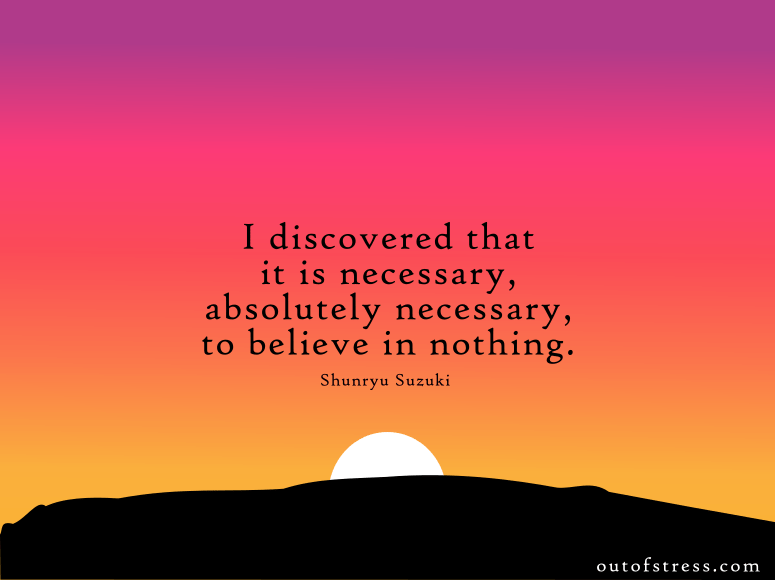
- “I discovered that it is necessary, absolutely necessary, to believe in nothing.”
- “A mind full of preconceived ideas, subjective intentions, or habits is not open to things as they are.”
- “The true purpose [of Zen] is to see things as they are, to observe things as they are, and to let everything go as it goes… Zen practice is to open up our small mind.”
- “No matter what God or doctrine you believe in, if you become attached to it, your belief will be based more or less on a self-centered idea.”
- “The practice of Zen mind is beginner’s mind. The innocence of the first inquiry — “what am I?” — is needed throughout Zen practice.”
- “As long as you have some fixed idea or are caught by some habitual way of doing things, you cannot appreciate things in their true sense.”
- “Instead of gathering knowledge, you should clear your mind. If your mind is clear, true knowledge is already yours.”
Interpretation:
All of these quotes by ‘Shunryu Suzuki’ point toward a simple truth – that we should become conscious of our conditioned mind. Right from the day we are born, our mind starts to pick up information from the external world and starts to become conditioned. What we hear our parents, peers and media say, become our belief systems. For example, when a parent tells a child that he belongs to a certain religion, that becomes one of his/her beliefs. Once we grow up, these beliefs become the filter through which we look at and perceive reality.
Suzuki teaches you to throw away this filter. He wants you to discard all these accumulated beliefs and look at things from a blank state of mind.
To reach this blank state, you need to first become aware of your conditioned beliefs and the way your mind uses these beliefs. This can easily be achieved by remaining conscious of the thoughts produced by your mind.
Thoughts are produced from existing conditioned beliefs (in your subconscious mind) and by becoming conscious of these thoughts, you can get to their root or the belief lying underneath. Once you become conscious of these beliefs, they no longer control you and you start to become free from them.
You also develop the ability to start seeing things from a neutral perspective (using a beginner’s mind) without the veil of your accumulated beliefs.
2. On the secret to practicing Zen
- “This is also the real secret of the arts: always be a beginner. Be very very careful about this point. If you start to practice zazen, you will begin to appreciate your beginner’s mind. It is the secret of Zen practice.”
Interpretation:
As already discussed above, Suzuki points out that the secret to practice Zen is to have a blank mind and to perceive everything from this state of mind. This is the the real secret to practicing the art of Zen.
3. On letting go of the past
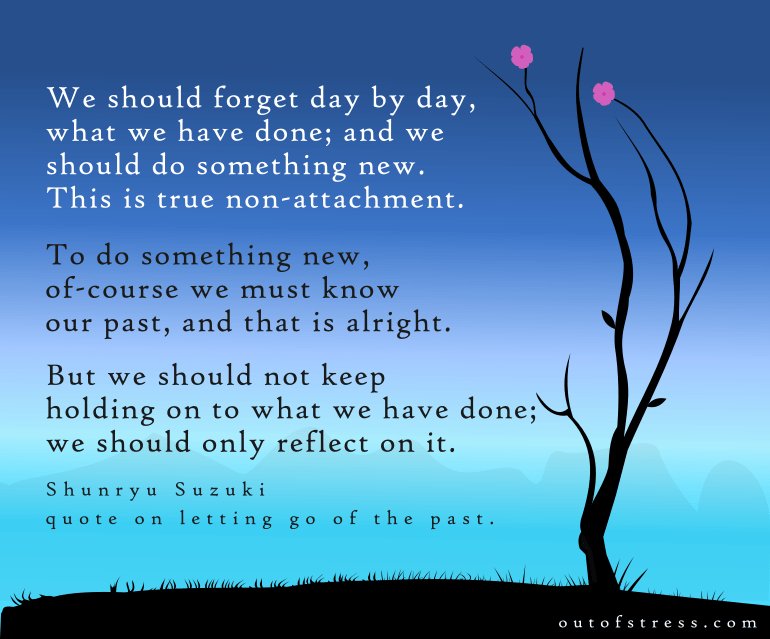
- “We should forget, day by day, what we have done; this is true non-attachment. And we should do something new. To do something new, of course we must know our past, and this is all right. But we should not keep holding onto anything we have done; we should only reflect on it.”
- “It is necessary to remember what we have done, but we should not become attached to what we have done in some special sense.”
Interpretation:
In order to move forward in life, it is important that we let go of the past.
Letting go of the past simply means removing our attention from the past and refocusing the attention toward the present cause it is the present moment that contains the energy of creativity. It is only by refocusing on the present can we start creating again.
Suzuki also points out through these quotes that we need to learn from what happened in the past by reflecting on it. The past has valuable lessons to teach us which we must be open to learning. You can only do this when you accept complete responsibility for the past.
Taking responsibility does not mean you start to blame yourself. You need to forgive yourself completely while taking responsibility. This way you are in a position to reflect on the past fruitfully and learn the lessons without holding onto the past.
4. On self awareness
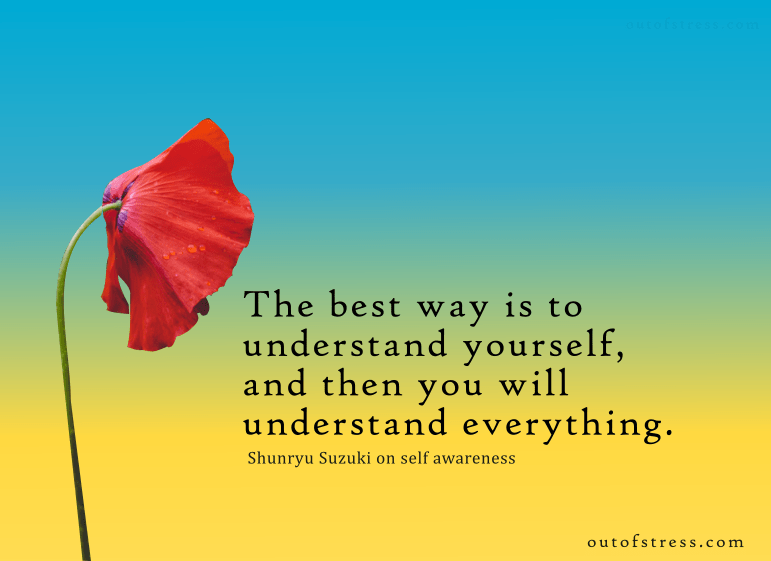
- “The best way is to understand yourself, and then you will understand everything.”
- “Before you make your own way you cannot help anyone, and no one can help you.”
- “keep finding yourself, moment after moment. This is the only thing for you to do.”
Interpretation:
In order to understand the world, you first need to understand yourself. You can travel throughout the world looking for answers, when in reality, all the answers lie within you. This is why self awareness has been preached by pretty much every great thinker alive.
So what is self awareness? Self awareness starts with getting in touch with yourself. The basis of self awareness is a conscious mind. As humans, we become lost in our mind. This is our default state of functioning. But it is only by becoming conscious of our mind (and its thoughts) can we start to understand ourselves.
A simple way to become conscious is to become conscious of your thoughts, or in other words look at your thoughts objectively from a third person’s perspective than being lost in your thoughts. This simple exercise is the beginning of self awareness. This is exactly what Suzuki means when he says, ‘find yourself, moment by moment‘.
5. On Self acceptance and being yourself
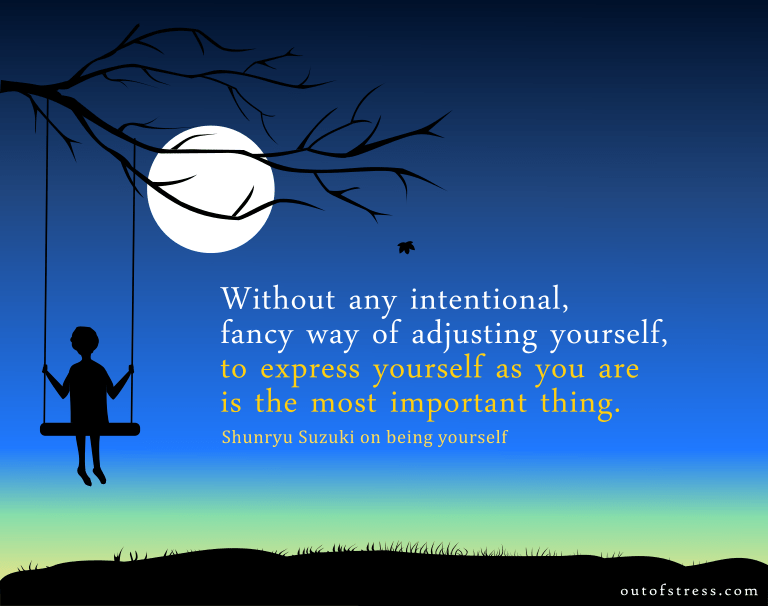
- “Without any intentional, fancy way of adjusting yourself, to express yourself as you are is the most important thing.”
- “When we do not expect anything we can be ourselves.”
Interpretation:
The beliefs that we are fed from a young age can sometimes block us from accessing our true nature. We start living a life of pretense and our true expression is curbed. And when we are not being our true authentic self, we start to attract situations into our life that are not in alignment with our deepest desires. Therefore, it is most important that you start to become conscious of your beliefs and start to discard beliefs that limit you and stop you from expressing your true self.
6. On self validation
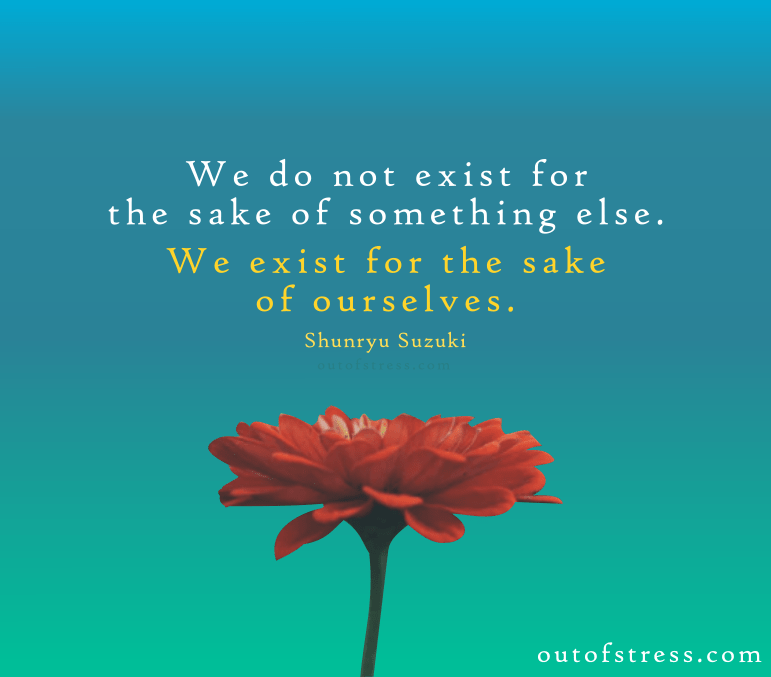
- “We do not exist for the sake of something else. We exist for the sake of ourselves.”
- “To live is enough.”
Interpretation:
When we are overly focused on living life to fulfill someone else’s exceptions or to fit into the ‘perfect ideal’, we start to lose touch with our authentic selves. Eventually, we end up being people pleasers and our life is dictated by others around us.
In order to break this vicious cycle, it is imperative to realize this simple truth that you alone are enough, you have nothing to prove to anybody. Become self validated and shun your need to live up to the expectations of others. Make it a habit to keep reminding yourself of this over and over again.
As you start to grasp this idea, you start to free up a lot of energy that you would otherwise waste worrying about what other people think of you and use it toward creative pursuits.
Suzuki is absolutely right in saying that, ‘to live is enough‘. This a powerful quote that can help you let go of false expectations and start embracing your true nature.
7. On letting go of thoughts
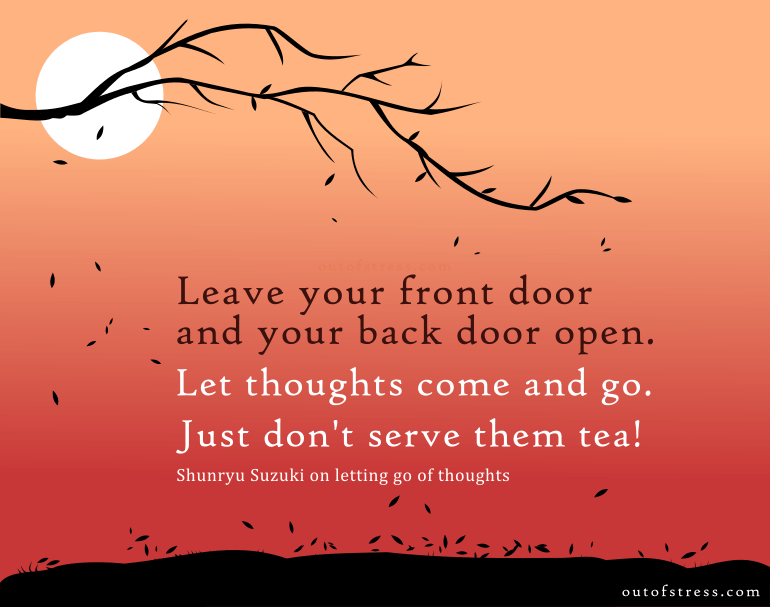
- “In Zazen, leave your front door and your back door open. Let thoughts come and go. Just don’t serve them tea.”
- “When you are practicing zazen, do not try to stop your thinking. Let it stop by itself. If something comes into your mind, let it come in, and let it go out. It will not stay long.
Interpretation:
Research indicates that the human brain generates over 60,000 thoughts on a daily basis and most of these thoughts are repetitive in nature. The practice of Zazen, like any other spiritual practice is about becoming free from the grasp of your thoughts (if at-least for a few moments).
But thoughts cannot be stopped by force cause forcing your thoughts to stop is akin to forcing your breath to stop. You cannot hold it longer and eventually you will have to let go and start breathing again.
Therefore, a more prudent way is to let the thoughts stop and settle down by themselves by simply removing your attention from these thoughts. A simple way to achieve this is to divert your attention from your thoughts to your breathing. As you focus all your attention on your breathing, the thoughts stop getting your attention and slowly being to settle down. This is because, your thoughts thrive on your attention and when you remove attention from your thoughts, they start to fade away.
This is exactly what Suzuki means by the phrase, ‘serving them tea‘ in the second quote. Giving your thoughts attention is akin to serving them tea and inviting them to stay. Don’t give them attention and they feel unwelcome and go away.
This is really a beautiful as well as a powerful quote by Suzuki that will serve as a constant reminder to let go of unwanted thoughts.
8. On accepting change
- “When we realize the everlasting truth of “everything changes” and find our composure in it, we find ourselves in Nirvana.”
Interpretation:
The very nature of life is change and all changes are cyclic in nature. The day changes to night and the night changes back to the day. But sometimes it is difficult for our minds to adapt to change because our minds seek security in the known. So often times, you might find yourself stuck in a situation that you do not like very much but prefer staying the same place as it is familiar to you. By becoming aware of this behavior of the mind and by accepting the core fact that everything in life is transient, we start to become more accepting and this helps us go with the flow of life.
9. On Concentration
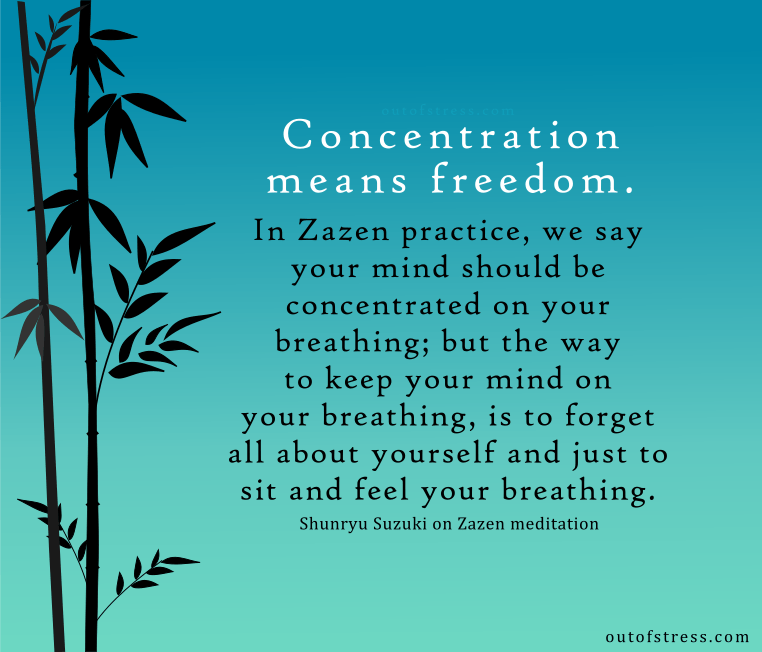
- “Concentration is not to try hard to watch something… Concentration means freedom… In zazen practice, we say your mind should be concentrated on your breathing, but the way to keep your mind on your breathing is to forget all about yourself and just to sit and feel your breathing.”
Interpretation:
When you focus on your breathing with all your attention, that is all that remains. You are no longer feeding any attention to your thoughts, and thereby you let go of your beliefs, your sense of identity and your ego. You simply exist without a sense of I.
And when you are free from your sense of ‘I’, you experience true freedom which is why Suzuki equates concentration to true freedom in his quote. This is also true when for instance, you are lost in an activity so deeply that you forget yourself. Like creating a work of art or even reading a fascinating book or watching a movie. This is the reason why we as humans flock to such activities – to escape our egoic sense of self.
But again, the best way to do this is by consciously focusing our attention, like in the practice of Zazen.
10. On learning to practice Zen
- “Our effort in our practice should be directed from achievement to non-achievement.”
- “Our way to practice is one step at a time, on breath at a time.”
- “The true purpose of Zen is to see things as they are, to observe things as they are, and to let everything go as it goes.”
- “In our practice we have no particular purpose or goal, nor any special object of worship.”
- “The best way is just to do it without having any joy in it, not even spiritual joy. This way is just to do it, forgetting your physical and mental feeling, forgetting all about yourself in your practice.”
- “Zen is nothing to get excited about.”
- “Do not be too interested in Zen.”
Interpretation:
It is important not to be lost looking at the finger that is pointing toward the moon but to follow where the finger is pointing and look at the moon itself.
If we are too focused on the ideologies of Zen, we get lost in Zen, or in other words, we keep looking at the finger rather than where it is pointing. This is why Suzuki asks you to not get too attached to the idea of Zen, nor to get too excited about practicing Zen. It is also important not to have an end goal in mind, cause the moment you have an end goal (eg. reaching bliss), you get lost in the process rather than simply being.
The objective of Zen is to simply be as discussed in earlier points and that can only be achieved when we are no longer involving the mind in our practice – by simply focusing your attention on your breathing – and taking it one step at a time, or one breath at a time.
11. On being one with the universe
- “Whereever you are, you are one with the clouds and one with the sun and the stars you see. You are one with everything.”
The same life energy (or consciousness) that is present within every single atom that forms this universe is also within us. Even though on the surface, it does appear that we are separate, we are connected with every single element of existence be it physical (manifested reality) or the non-physical (consciousness).
Also Read: 45 Profound Quotes By Rumi On Life (With Interpretation)







